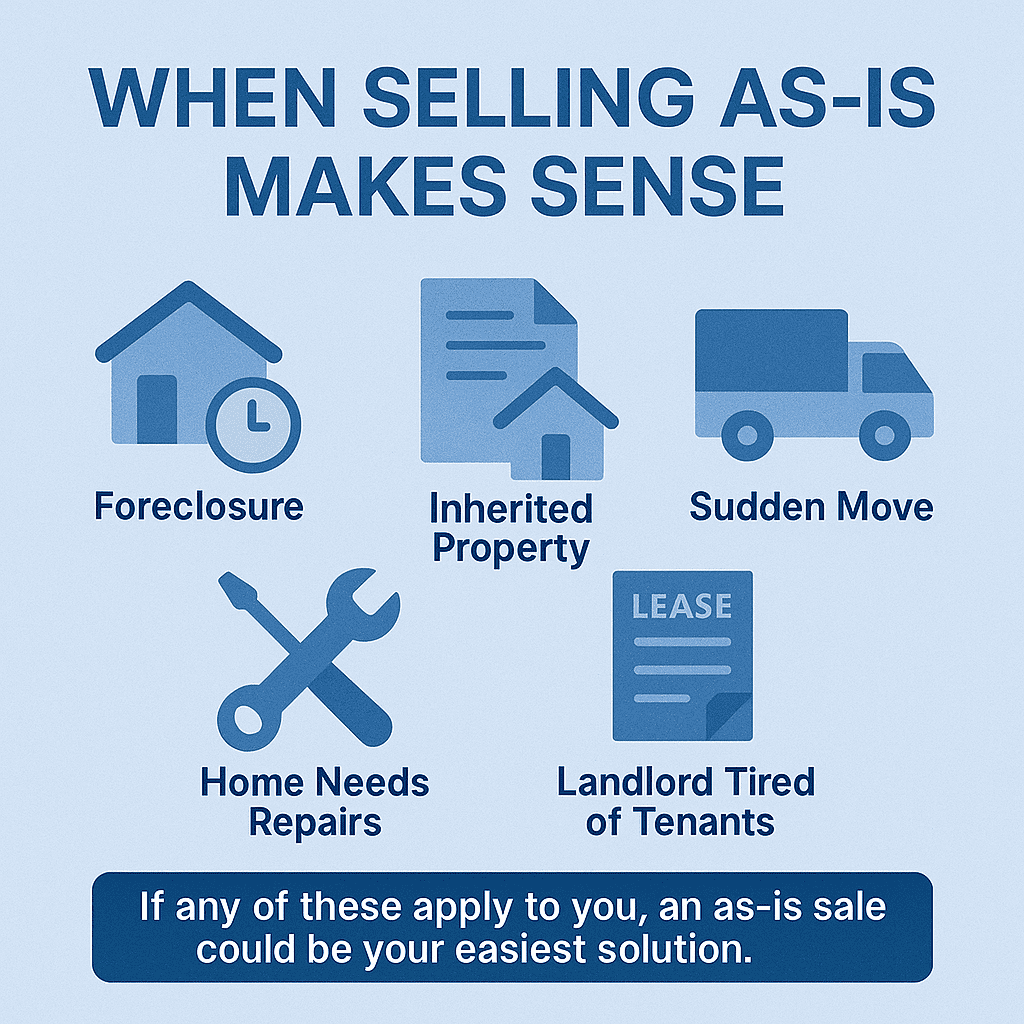To sell a home “as is” in real estate means you’re offering the property in its current condition, without making any repairs or upgrades before the sale. Buyers understand that what they see is what they get. This option is often used by homeowners facing time constraints, tight budgets, or difficult property conditions. While the term may sound risky, selling as-is can actually simplify the process when done correctly. It signals to buyers, especially investors or cash home buyers, that you’re looking for a straightforward transaction without delays.
Selling Your Home As-Is: What You Need to Know
Selling your home as-is means you won’t need to make repairs, clean up, or renovate before listing. For many homeowners, this simplifies the process—especially if you’re short on time or dealing with a challenging property.
The simple definition of “as-is” in real estate
In real estate, “as-is” means you’re selling the home in its current condition, flaws and all. You’re telling buyers upfront that you won’t be making any improvements or fixes before closing. This doesn’t mean you can hide major issues—you’re still required to disclose anything that could impact the property’s value, like roof damage or plumbing problems. But it does mean you can skip the costly prep work and move forward more quickly.
Why some homeowners choose to sell this way
Homeowners often sell as-is when facing urgent situations like foreclosure, job relocation, divorce, or inherited property. Others simply want to avoid the hassle of fixing up an older home. Selling as-is is also popular for those who need a fast, cash-based sale without agent commissions or open houses. It can be the best option if you prioritize speed, simplicity, and certainty.
When Does Selling As-Is Make Sense?
Selling a house as-is makes the most sense when you want to avoid delays, upfront costs, or a drawn-out listing process. For many homeowners, it’s not just about convenience—it’s about necessity.
Common situations where it’s the smart move
There are several life situations where an as-is sale becomes the right call:
- Facing foreclosure: Time is limited, and selling as-is allows you to move quickly and avoid damaging your credit.
- Inherited property: You may live out of state or simply want to avoid managing repairs on a home you didn’t plan for.
- Sudden relocation: Job changes or personal emergencies may not allow for months of listing prep.
- Major repairs needed: When a house has foundation problems, roof damage, or plumbing issues, fixing it can be expensive and time-consuming.
- Tired landlords: Owners of rental properties often choose as-is sales when dealing with problem tenants or wear-and-tear.
Pros and cons you should consider
Pros:
- No need to spend money on repairs or cleaning
- Faster closing timeline, often within 7 days
- Cash offers from serious buyers, reducing fall-through risk
- Skip inspections, showings, and agent fees
Cons:
- Offers are typically lower than a fully renovated home
- You still need to disclose known issues (in most states)
- Some buyers may assume the worst about property condition
If your priority is a smooth, fast sale rather than squeezing every last dollar from the transaction, an as-is sale might be the best option for you.
What Buyers See When You Sell As-Is
Buyers see an as-is home as a unique opportunity—and a potential risk. Most understand the trade-off: they’re getting a house without the usual polish, but they also expect a more flexible price and a faster process.
How “as-is” sales are perceived by cash buyers
Cash buyers, especially investors, often prefer as-is properties. They’re looking for homes they can repair, rent, or resell, and they know how to evaluate a house that needs work. For them, your as-is listing signals less red tape. There are no delays from lenders, appraisals, or renovation requests. They come prepared to move quickly and take the property as it stands. This allows you to bypass months of traditional listing steps and avoid negotiations over small fixes.
Can buyers still request inspections or repairs?
Yes, even in an as-is sale, buyers can still request an inspection, and most will. The “as-is” label means you’re not agreeing to make repairs, but it doesn’t stop buyers from doing their due diligence. Some may try to renegotiate if they uncover major problems, while others will move forward if they’re comfortable with what they find. If you’re upfront and transparent about the home’s condition, it builds trust and can actually help speed up the closing.
Do You Still Have Legal Responsibilities?
Yes, selling a house as-is doesn’t remove your legal responsibilities as a homeowner. In most areas, sellers are expected to disclose known issues that could affect the home’s value or safety. It’s important to understand your local disclosure laws or speak with a real estate professional to ensure you’re in compliance.
What disclosure laws require you to share
Most states have disclosure rules that require you to inform buyers about known defects that could affect the property’s value or safety. This includes things like roof leaks, foundation cracks, water damage, or problems with electrical and plumbing systems. Even if you’re selling as-is, you can’t hide problems or pretend they don’t exist. Failing to disclose could lead to legal trouble later, especially if the buyer discovers the issue after closing.
The best approach is transparency. If you know something’s wrong with the house, say so. Buyers appreciate honesty, and clear disclosures can help protect you from future liability.
The truth about liability and known issues
Selling as-is does not mean you’re free from all responsibility. Concealing serious issues could lead to legal disputes after the sale. Sellers are encouraged to be transparent and consult a qualified advisor if unsure about disclosure obligations. However, if you’re upfront and provide everything required by law, you’re in a strong position to close the deal cleanly. Having clear terms in your purchase agreement can help align expectations. A licensed real estate agent or attorney can help you ensure everything is properly documented.
How Much Could You Lose Selling As-Is?
Selling a house as-is usually means accepting a lower offer, but that doesn’t always mean you’re losing money. The real trade-off is between time, effort, and final sale price
Understanding “after-repair value” and discounting
Buyers calculate their offers based on what the home could be worth after repairs, known as the “after-repair value” (ARV). From that, they subtract estimated repair costs, closing expenses, and a margin for profit. What’s left is your offer.
For example, if your house could sell for $300,000 after $30,000 in repairs, a cash buyer might offer $240,000 to $250,000. While that number may seem lower than market value, it reflects the reality of what they’ll invest and risk. For many sellers, the convenience of skipping repairs and closing fast offsets the difference.
Is it worth fixing anything before selling?
That depends on your situation. If you have the time, money, and ability to make small updates—like cleaning, painting, or addressing obvious damage—it could help raise your offer slightly. But major renovations aren’t always worth it, especially if you need to sell quickly or don’t have the resources.
In most cases, as-is buyers aren’t expecting perfection. They’re prepared to take on repairs, and they factor that into their offers. The key is knowing whether the extra time and money you’d spend fixing things will bring a bigger return, or just add stress.
How Cash Buyers Make Selling As-Is Easy
Cash buyers specialize in simplicity. When you sell your home as-is to a cash buyer, you eliminate the traditional real estate hurdles that often delay or derail sales.
No repairs, no showings, no stress
One of the biggest benefits of working with a cash buyer is that you don’t need to fix anything. Leaky roof? Outdated kitchen? It doesn’t matter. Cash buyers purchase homes in any condition. You also avoid the disruption of open houses, cleaning, and multiple buyer visits. There’s no need to impress anyone or worry about last-minute walk-throughs. The process becomes direct and personal, and you stay in control from day one.
Fast closings and fair offers from real estate investors
Cash buyers are typically real estate investors who know how to evaluate properties quickly and make competitive offers. Unlike traditional buyers, they don’t need mortgage approvals or lengthy underwriting. Once you accept the offer, the closing can happen in as little as a week. That speed can be crucial if you’re dealing with foreclosure, relocation, or an inherited property. Fairness matters too—reputable investors explain how they calculate your offer, using local market data and repair estimates. You get a straightforward deal without surprises.
3 Simple Steps to Sell Your House As-Is
Selling your house as-is doesn’t have to be complicated. In fact, with the right buyer, the process is often faster and easier than you’d expect.
Step 1 – Share your property details
It starts with a simple conversation. You provide basic information about your house—its location, condition, and your situation. There’s no pressure or commitment. This step helps the buyer understand your home and start the evaluation process.
Step 2 – Get a fair cash offer
After reviewing your property and comparing it to local market data, a reputable cash buyer will give you a straightforward offer. This usually happens within 24 to 48 hours. There are no commissions, hidden fees, or repairs required—just a clear number based on your home’s value in its current condition.
Step 3 – Close on your schedule
If you accept the offer, you choose the closing date. Some sellers need to move fast; others prefer more time. Either way, the paperwork is handled for you, and you can skip the stress of traditional sales. Most closings happen in a week or less, and you walk away with cash in hand.
Final Thoughts: Is Selling As-Is Right for You?
If you’re looking for a faster, simpler way to sell your home—especially one that needs work—selling as-is may be the right path. It removes the stress of repairs, showings, and long negotiations, giving you a clean exit on your timeline.
While you may not get full retail price, the time saved and hassle avoided often make up the difference. This option works especially well for homeowners in difficult situations—whether you’re dealing with foreclosure, an inherited property, or a sudden life change.
Ultimately, selling your house as-is gives you control. You choose when to sell, who to sell to, and how quickly you want to move on. If that kind of flexibility and peace of mind matters to you, then selling as-is is a smart, practical solution.
Frequently Asked Questions
Can I sell as-is if my home has major damage?
Yes, you can. Many cash buyers specialize in purchasing homes with structural issues, water damage, fire damage, or code violations. As long as you’re honest about the condition and follow disclosure laws, you can sell even if the home needs significant repairs.
Will I get a lower offer selling as-is?
Most likely, yes—but that doesn’t mean you’re losing out. Offers are adjusted for the cost and risk the buyer takes on. However, when you factor in the money saved on repairs, commissions, and holding costs, the net difference is often smaller than expected. Plus, you gain speed, certainty, and convenience.
What if I change my mind after listing as-is?
If you haven’t signed a purchase agreement, you’re free to change your mind. Selling as-is doesn’t lock you into anything until a deal is officially accepted and signed. Reputable buyers understand that situations change, and a good cash buyer won’t pressure you to proceed if you’re not ready.





